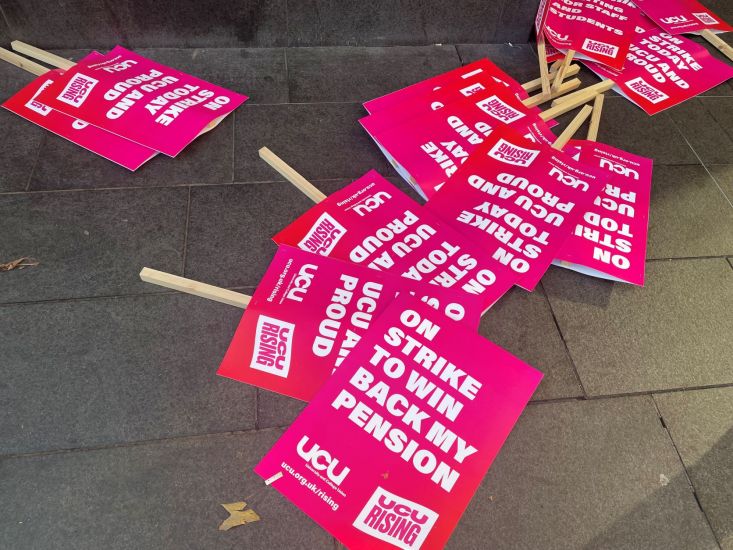As everyone knows, the UK’s higher education sector is in financial crisis. The Office for Students projects that 40 per cent of universities will be in deficit this academic year – and 72 per cent by 2025-26. Post-92s, which have not benefited from the windfall from lower contributions to the Universities Superannuation Scheme (USS), are on particularly precarious ground. And whatever English institutions gain from the hike in student fees to £9,535 will mostly be wiped out by increased National Insurance contributions.
This is the context in which the University and College Union (UCU) has launched its consultative ballot on universities’ latest pay offer – ranging from 2.5 to 5.7 per cent – and on proposed terms of reference for negotiations on pay-related issues, including a pay spine review, contract types, equality pay gaps and workload.
The UCU’s Higher Education Committee has recommended rejecting the pay offer while accepting the terms of reference. Members should think hard before submitting their own views. Before pushing for industrial action, they should carefully weigh the broader context of sector finances, political realities and union capacity.
Even a flawless campaign of industrial action is unlikely to yield substantial pay increases in the current climate. And an improved pay award could come at a cost: deepening universities’ deficits and potentially leading to further redundancies or cuts to courses. Avoiding layoffs is the burning issue of the hour and, arguably, where our effort should be concentrated.
ADVERTISEMENT
This is not to dismiss the issue of pay stagnation. UK university staff have endured years of below-inflation increases. But striking on pay now – against employers already facing existential pressures – could worsen the sector’s problems without delivering solutions.
Some argue that industrial action could pressure the government to reform higher education funding more radically. However, unlike the nurses’ and doctors’ unions, the UCU does not negotiate with the government on pay but, rather, with the employers’ association, UCEA – which would argue that it cannot change government policy. And Labour’s priorities for extra funding are the NHS, adult social care and schools. A pay dispute that aims to change government policy, therefore, risks being irresolvable.
ADVERTISEMENT
Moreover, university strikes lack the political leverage of NHS or railway strikes because they don’t create the same public pressure to resolve the issues. Our actions are not a matter of life and death. Our strikes inconvenience students and disrupt teaching but don’t stop graduation and progression.
Would it, as some argue, force Labour’s hand if the UCU presented a united front with the other higher education unions, Unison (which is balloting this November) and Unite? I suspect not. Even in the new “winter of discontent” of 2022-2023, when all three unions held strikes alongside multiple other sectors, from tube staff to schoolteachers, the UCU’s pay settlement – ranging from 5 to 8 per cent – was broadly in line with offers in other industries, all of which were below inflation.
Moreover, after years of near-annual industrial action, it is understandable that members’ appetite for industrial action appears subdued, with fewer than half of delegates (45 per cent) at recent UK branch delegate meetings supporting strikes.
UCU would do better to prioritise negotiations on pay-related issues: workload, casualisation, equality pay gaps and the pay spine. Progress on these fronts would meaningfully improve working conditions and could compensate for the absence of a significant pay increase. Industrial action would most likely tear up these negotiations.
ADVERTISEMENT
How to address the sector’s ongoing wave of redundancies? Because staff at one institution are legally barred from striking on behalf of those at another, national industrial action over redundancies in the strict sense is not viable. However, local strikes at affected institutions could be coordinated nationally or regionally, while national messaging could highlight the crisis. A campaign centred on saving jobs and pressuring the government to properly fund the sector – aligned with UCU’s existing Reclaim HE campaign – could build solidarity with other unions, students and the public.
The union could consider organising large-scale demonstrations in major cities, akin to the 2010 “Fund Our Future” rally it held with the National Union of Students. Further underscoring the funding crisis without hurting members’ pockets through strike action is no bad thing.
However, given that Labour accepts there’s a crisis and has promised reform next summer, the real hard graft of lobbying and discussions inside Westminster will probably be more critical for influencing policy. As meetings unfold next spring over Labour’s higher education priorities, UCU should consider involving members by holding its own debriefings and consultation with them on evolving policy ideas.
In short, as someone aligned with the Campaign for UCU Democracy, I advocate for pragmatism. The UCU must prioritise tangible gains for members while avoiding strategies that risk alienating them or deepening the sector’s financial woes. This requires honest communication with members about the union’s capacity and the political realities of the moment.
ADVERTISEMENT
As we enter a new political era, I implore members to take an active role in shaping the union, in branches and committees. This includes voting not only in the current consultation (which closes on 3 December) but also in National Executive Committee elections for candidates who prioritise the interests of the broad membership.
By focusing on achievable goals and reserving members’ energy for when it counts, the UCU can emerge a stronger, more effective union. We do not need revolution. We need results. We must choose our moment to strike wisely.
ADVERTISEMENT
Jak Peake is a senior lecturer at the University of Essex. He thanks Michael Abberton and Renee Prendergast for their feedback, suggested edits and comments. This is an edited version of a longer piece that appears on the Campaign for UCU Democracy’s website.
